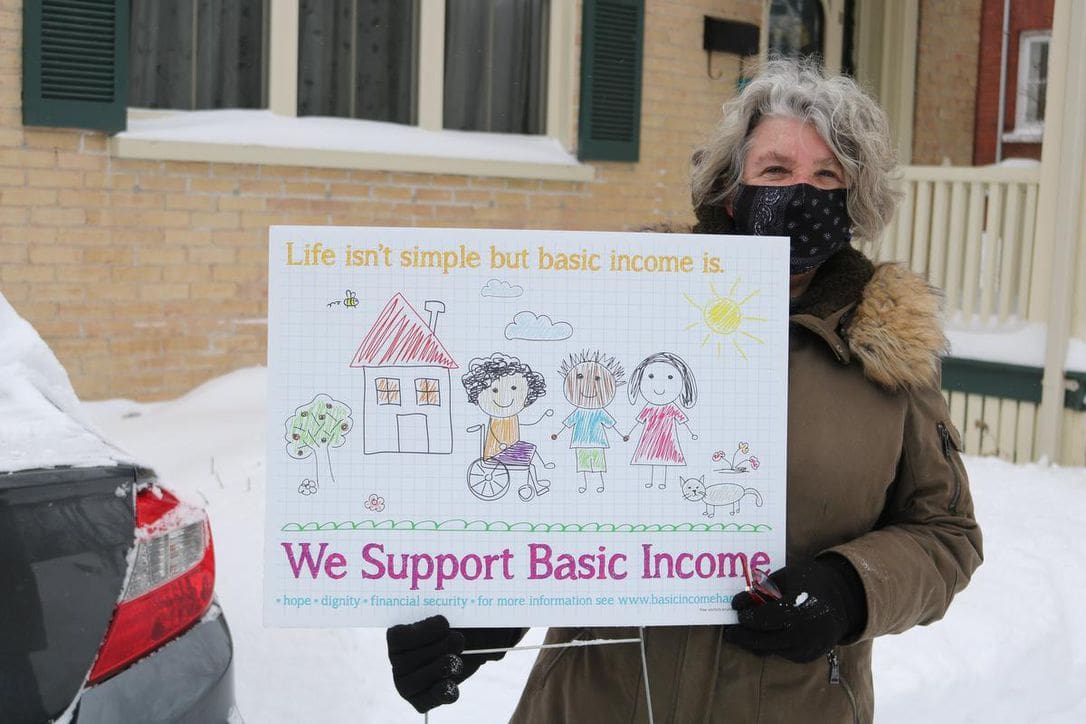Introducing a Basic Income Guarantee would cost a lot of money. The good news is that we can finance them by raising taxes on the superrich.
Opinion by Caterina Lindman
Did you know that Canada introduced a poverty reduction strategy in 2018? Our strategy is to reduce poverty 50 per cent by 2030, in line with the UN sustainable development goal for poverty reduction.
While there are many good reasons to have a poverty reduction strategy for Canada, I am wondering whether we are selling ourselves short.
Twelve per cent of Canadians live in poverty, and a 50 per cent reduction in poverty by 2030 means that six per cent of Canadians would still be living in poverty, and that’s after 10 more years of strategic poverty reduction.
Rather than an incremental poverty reduction strategy, why can’t we have a poverty elimination strategy in Canada? Why can’t we have bold action, over the next several years, for eliminating poverty in Canada by introducing a Basic Income Guarantee for all Canadians?
Canada has a basic income for seniors, through the GIS and OAS programs, as well as one for families with children through the Canada Child benefit. What is missing is a Basic Income Guarantee for working age adults without children. Those on welfare only get about one-half of what they’d need to meet Canada’s official poverty line. A Basic Income Guarantee would top up people’s income to the poverty line, while incentivizing paid work, by clawing back income at a rate of, say, 50 per cent. (The clawback rate of 50 per cent was what was used in Ontario’s basic income pilot.)
Yes, introducing a Basic Income Guarantee would cost a lot of money. The Parliamentary Budget Office calculated a net cost of $23 billion annually using the income amounts from Ontario’s Basic Income Pilot. The numbers are around $60 billion during a pandemic. We don’t expect to be in this pandemic forever, and the beauty of a Basic Income Guarantee is that it automatically puts more money into people’s hands when they need it.
The good news about these figures is that we can finance them by raising taxes on the superrich.
Perhaps Chrystia Freeland is the one to do it. She’s the only Canadian finance minister in history to write a book about plutocrats, subtitled “The rise of the new global superrich and the fall of everyone else.”
The finance minister could introduce a wealth tax. A two per cent tax on assets in excess of $20 million is worth $11.2 billion per year.
Another opportunity is to consider that while wages are taxed at 100 per cent, capital gains are taxed at 50 per cent.
Eighty-seven per cent of the benefit of this lower tax rate goes to the top one per cent of income earners. Rectifying this would raise $11.3 billion more in annual revenues.
The government could also levy a micro-tax of 0.2 per cent on financial transactions. This tax might dampen the amount of financial transactions, which would be welcome, because it would reduce the amount of speculation and short-term trading. There are $80 trillion of financial transactions in Canada, and without behavior changes, a micro-tax of 0.2 per cent would raise $160 billion annually. We could do a lot of good things with that revenue, easily financing a Basic Income Guarantee and a post-pandemic green recovery.
Some people think that a Basic Income Guarantee encourages laziness. There was no evidence of that from the Ontario Basic Income Pilot.
In fact, 81 per cent of participants felt somewhat or much more motivated to find a better paying job.
Over 37 per cent of participants reported a somewhat or much better rate of pay. The safety net was enough to give some participants the courage to start their own business.
There were some other great outcomes from the Basic Income Pilot. Eighty per cent reported better overall health, while 83 per cent reported better mental health. Forty-three per cent of participants drank less, while five per cent of participants quit drinking. Better health and less alcoholism, aside from its intrinsic value for people’s lives, saves our health-care system money.
Because poverty impacts Indigenous and racialized communities more often, a Basic Income Guarantee is a concrete step toward reconciliation and racial justice.
I am looking forward to Canada co-operating with the province of Prince Edward Island, which wants to implement a Basic Income Guarantee. We should seize this opportunity to try it out, and then Canadians can decide whether the whole country should have it, similar to the way that universal health care was pioneered in Saskatchewan before being implemented federally.
A Basic Income Guarantee will help all Canadians reach their full human potential, and it can be financed by reducing wealth inequality.
_____
To see original article please visit: https://www.stcatharinesstandard.ca/opinion/contributors/2021/03/06/a-guaranteed-basic-income-would-help-all-canadians-fulfil-their-full-human-potential.html





















